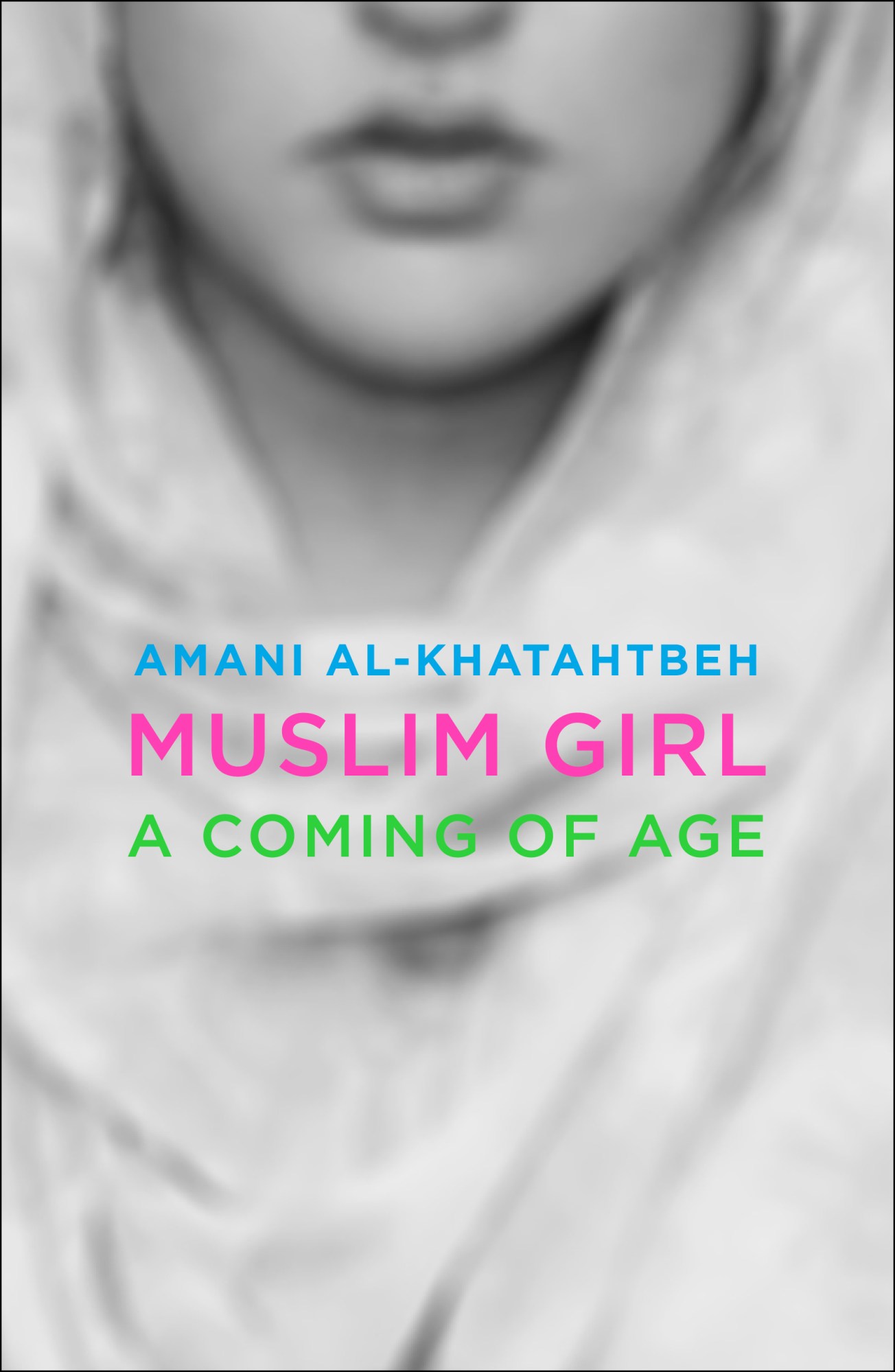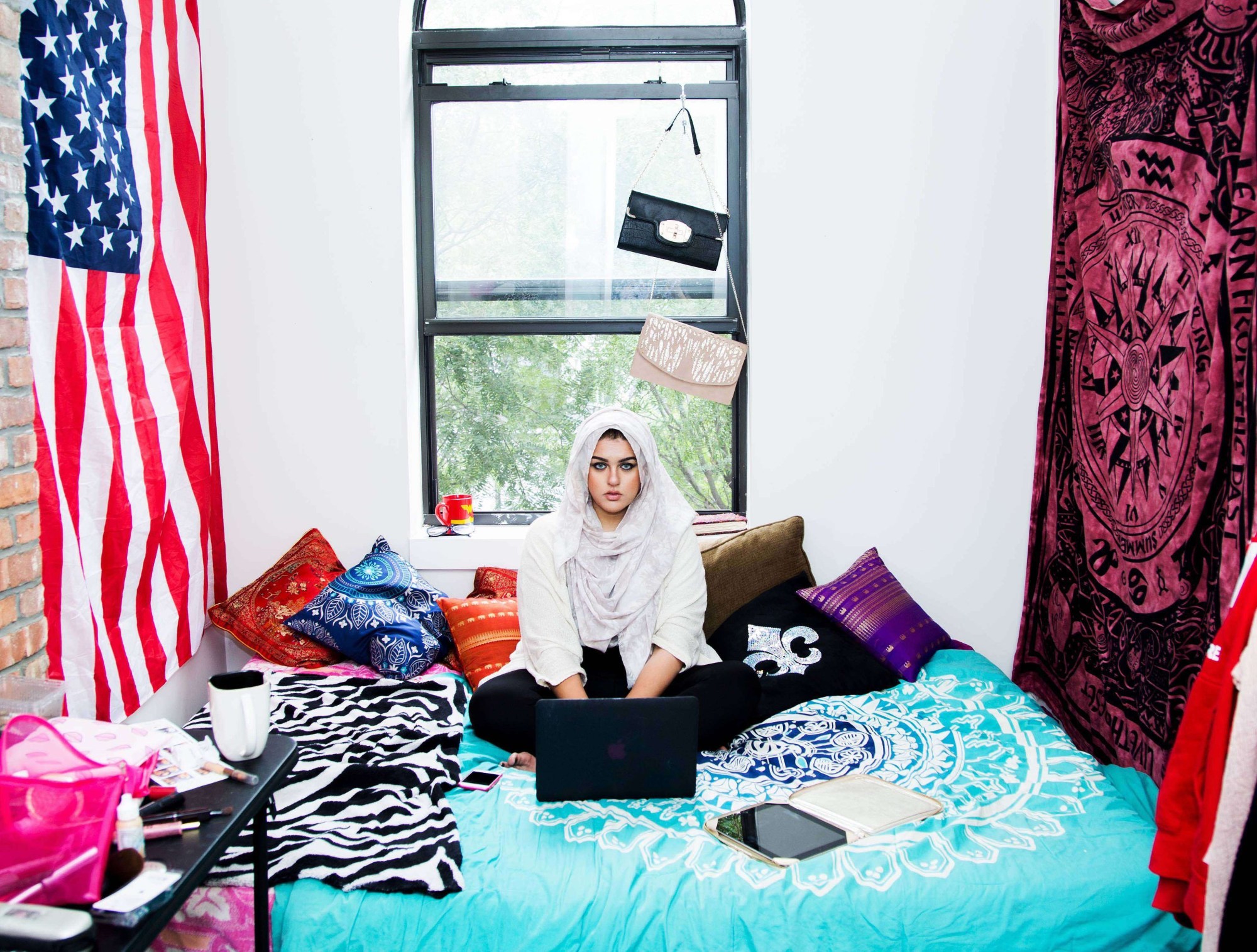Amani Al-Khatahtbeh is “perfectly aware of [her] role as the Token Muslim Girl these days,” she writes in the opening of her memoir, Muslim Girl: A Coming of Age. The boundaries that the 24-year-old has managed to break have turned her website Muslim Girl into a self-proclaimed “cultural phenomenon” for millennial Americans, and won her access to platforms that still exclude visibly Muslim women.
On the morning of the day we meet, she’d recorded a BBC radio segment about the US presidential election, during which she had had to share a room with a Donald Trump supporter who spewed insults at Muslims. As the only Muslim on the panel, Al-Khatahtbeh played multiple roles — speaking up against the vilification of an entire religion, and busting stereotypes of hijab-wearing women. The fight against the “commodification” of the Muslim mind and body is a deeply personal one for Al-Khatahtbeh. And while she’s not the first person to challenge the status quo, her assertive, don’t give a fuck attitude and distinctly millennial brand have gotten her noticed. In the past year she’s taken seats next to Bill Clinton, Gloria Steinem, and Shonda Rhimes. She’s written columns for mainstream media outlets like Forbes and Teen Vogue. And she’s hosted her own web show on MTV.
For Al-Khatahtbeh, speaking honestly and without constraints is vital. “There have been a lot of times where different outlets have wanted to use me as an ornament — to tick off that box where a Muslim woman is included without having to speak, and that’s important for me to consider. [I ask myself,] ‘Am I going to have the opportunity to say something?'” she tells me.
In her new book, Al-Khatahtbeh captures her journey from childhood: the racism she encountered as an Arab muslim born and raised in New Jersey and how it stirred feelings of intense insecurity and worthlessness. Emotions that were not just a culmination of adolescent angst, but also magnified by growing up in one of the most Islamophobic times in American history.

Al-Khatahtbeh was only nine years old when the September 11th attacks happened. It’s difficult to translate this experience for the regular American teenager, but for Al-Khatahtbeh so much of the hostility and backlash during that time shaped where she is today. It’s also been formative for what she calls “the 9/11 generation”: young Muslims who grew up in the aftermath of the event. “It’s already such a sensitive time in a young person’s life, so to have to endure that — literally the most intense experience of Islamophobia — was obviously very definitive for a lot of us,” she explains. The post-9/11 era compelled an awakening that’s made young American Muslims acutely aware of media narratives and misrepresentation. And this consciousness has fuelled, she says, an undeniable entrepreneurialism and creativity among young Muslims in the West in an effort to “push back” and reclaim spaces with projects like Muslim Girl.
Al-Khatahtbeh has channeled much of the vulnerability and isolation she experienced in her younger years into her online community, helping it grow into a viral sensation. She has taken on discussions she feels too few people are having and been critical of both the outside world’s perception of Islam and of ultra-conservative segments within the Muslim community. “We published a conversation from a transgender Muslim woman convert about what her experience has been — she referred to God as ‘She’ in her article and everyone just went haywire,” she proudly recalls. Doing the unexpected is her flavor, especially using a distinctly millennial language; content categories on her site include “#woke” and “#fierce.”
It seems that this strategy has paid off — readership is up, and investors have come on board to help make Muslim Girl into a prominent media platform. Of course, all of this has come at a moment — when being Muslim in America is still constantly regarded as a threat, and political candidates are fuelling the fire. “It’s just being escalated to this pulpit for the highest office in this land, it’s causing this really horrible life-or-death situation for Muslims, especially with the escalation of hate crimes,” says Al-Khatahtbeh. Yet, she has seized this moment, because with suspicion and fear come curiosity and room for someone to take the mic.
There’s certainly a privilege in being a Western-educated, attractive, lighter-skinned female — one that Al-Khatatbeh acknowledges but is still able to turn on its head. While Muslim Girl, the digital platform, is very much about the plurality of Muslim women’s experiences, Muslim Girl the book is almost exclusively about how Al-Khatahtbeh has been emboldened by that experience. There’s a risk that this work too will be taken as speaking for all Muslims, especially because narratives like this are so few and far between. But her book reads like a personal manifesto. She uses language drawn from racialized writers and academics, while exposing the double standards that are imposed on all women in Western societies, not just Muslim women.
In one particular passage, Al-Khatahtbeh precisely captures the societal obsession with women’s (especially Muslim women’s) appearances: “Then, of course, you have to be fashion-forward. Like, you need to wear a headscarf and show that you’re still different, but you need to make them forget that you’re different by mixing it with the perfect combination of Western trends to remind everyone that you’re also the same.” All the while, neglecting the professional, academic, leadership accomplishments of these same women.
“I’m not just trying to put out a cookie-cutter story of being a Muslim girl today, I’m trying to shift our feminist lexicon, which has completely excluded us for generations,” she says. Invitations from the White House and roundtables with CNN are a remarkable feat, and experiences Al-Khatahtbeh has relished without compromising the girly appeal of her brand. The pink-accented color scheme of her website, her selfies with Kim Kardashian, and her appearances at Beautycon are all part of her message that there’s no conflict in being young, Muslim, feminist, and fabulous.
In her memoir, Al-Khatahtbeh packages powerful statements and shines a light on her achievements, often in the understanding that her readers may not yet be familiar with her site. The book is a powerful testament to the realities of daily life for so many young Muslims in America, and to Al-Khatahtbeh’s own role as an ambassador. “The reason it’s called Muslim Girl, obviously, [is that] when you’re a girl you create the most sensitive impression of the person that you are, of who you’ll become — that’s when all that formation happens,” she says. However, while, Al-Khatahtbeh’s writing reveals the frustration of her early years, and details her personal and professional struggles, there’s little description of the woman she’s become. The implication, perhaps, is that her formation is still a work in progress; we’ll have to wait and see how Muslim Girl grows up.
“Muslim Girl: A Coming of Age” is out today through Simon & Schuster.
Credits
Text Sana Anoshe Malik
Photography Jenna Masoud, courtesy Simon & Schuster
